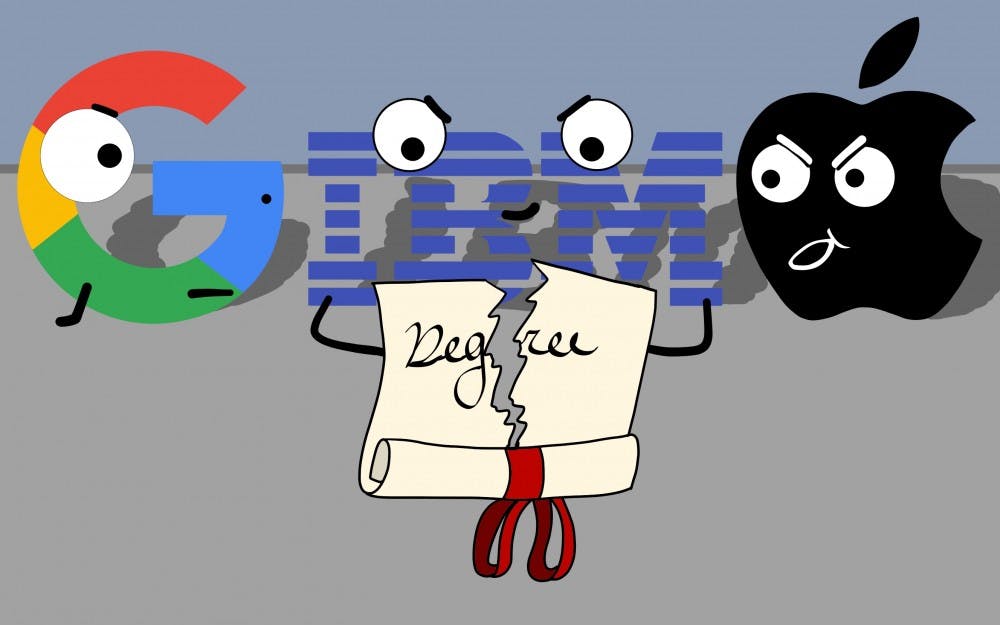Google, Facebook and IBM are among an expanding list of major corporations opening their doors to people without college degrees, allowing those with technical educations to be hired instead.
For computer science students and developers, the idea of technical online education and coding bootcamps are growing more and more attractive as a college alternative due to this drop in a college degree requirement.
Hemanth Venkateswara, a post-doctoral researcher at the School of Computing, Informatics and Decision Systems Engineering, said that online resources can provide someone with enough information and skill to land a job in the computer science field.
“Right now, with learning math through online courses and books, people are able to get all the skills that the University sort of provides," Venkateswara said. "So, I don’t see anything really exclusive the college diploma gives a candidate anymore."
Despite this, Venkateswara said he believes that online courses do not offer the stability and support that a structured four-year university provides.
“What the online resources offer is a lot of variety and options out there, but you don’t have a fixed curriculum, so you don’t know what you are gaining," Venkateswara said. "So, you will have to be very selective in picking out the courses you want."
Venkateswara said if a student decides to not to get a traditional college degree and is not aware of what’s required, they may select a course or bootcamp that doesn't complete their needs.
Choosing the online learning route can be dangerous for students that lack the integrity to follow their own unstructured schedule, but for those that are diligent enough, online learning offers enough resources to support a solid education.
Javier Gonzalez Sanchez, a professor in the School of Computing, Informatics and Decision Systems Engineering said that in the engineering industry, there is a great need for people with technical skills.
“There (are) a lot of companies, a lot of jobs and the universities do not provide enough people with technical backgrounds, so the companies need to open the door,” Sanchez said.
Because a strict college degree is no longer in the way, companies are also able to hire people who may not have had the resources to afford a college education, possibly increasing socioeconomic diversity in the workplace.
“If you go to school, it is good for you to have a group that is diverse," Sanchez said. "It’s leveling. It’s cultural understanding. It’s something that is good for everyone, and the industry knows that."
Sanchez said he believes that an increase in diversity in the engineering field is a healthy step, especially since the space is usually dominated by males.
“Someone else with a different background, (like) a woman, they will have a different point of view, and they are going to see things that I am not going to be able to see," Sanchez said. "You could think exactly the same thing about race, color, gender, whatever.”
Sanchez thinks that even though technical workshops and online resources offer plenty of information to those seeking technical education, there are aspects of college life that are deeper than just technical skill, such as project creation, cultural immersion and leadership training.
“Having a university degree tells (employers) that in some point in your life you attended four years participating in a university and that is beyond your grades, beyond your knowledge, it’s a different thing,” Sanchez said.
Keith Holbert, an associate professor in the School of Electrical, Computer and Energy Engineering, said he believes that a college degree is still an essential ingredient in the engineering field.
“If you want to be a professional engineer, meaning get a license in engineering, you have to get an accredited undergraduate degree," Holbert said. "That’s part of the prerequisite — period."
Unlike coding and certain aspects of computer science, it's much harder to find free information online on other engineering fields such as mechanical, biomedical and civil.
To be a part of the business in some engineering occupations such as Holbert’s, nuclear, higher level education is still required.
Holbert said that a college degree offers a much better base of knowledge for future engineers, even those who have the option of replacing a four-year university with technical education.
“We learn some of the fundamentals of the sciences, meaning chemistry, physics, mathematics, those tools which don’t change,” Holbert said. “Even as the technology changes, you’ve got this base foundation that you’re always got to drop back upon.”
Holbert said that while technical education such as coding bootcamps offer seemingly great opportunities to quickly enter the workforce and make a living, the education lacks the longevity and flexibility needed in today’s society.
“How long will those people be of value, however, to the company?" Holbert said. "If the landscape — the technology landscape — changes over time, will they suddenly find themselves replaceable because that isn’t the present technology?”
Reach the reporter at @kweinho2@asu.edu and follow @kevinweinhold on Twitter.
Like The State Press on Facebook and follow @statepress on Twitter.




